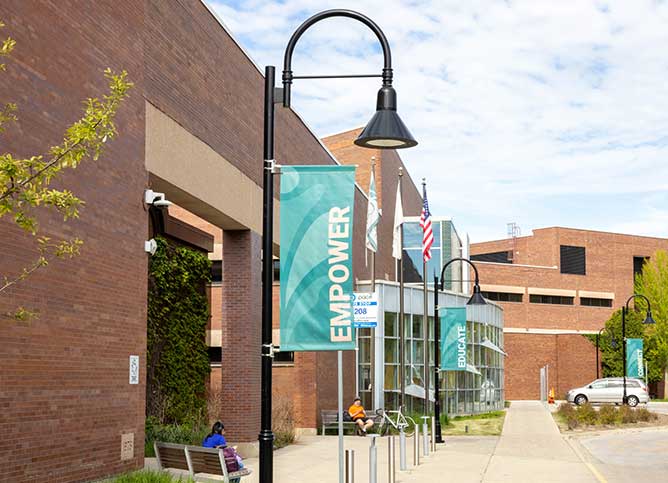Law enforcement and criminal justice professionals are always in high demand. With a degree in this field you can pursue careers such as police officers, special agents, juvenile officers, security officers, state troopers, court bailiffs, private detectives, probation officers, investigators, inspectors and corrections officers. When well-trained and well-educated people are in these roles, it helps to create a safer and stronger community.
We offer multiple curriculum paths for those interested in Law Enforcement and Criminal Justice. If you're interested in beginning a career in this field, then Oakton's Law Enforcement and Criminal Justice program will not only get you started but also help you stand out and develop special key skills that you'll be able to put to work in your career.
Our courses are acceptable for transfer to baccalaureate programs in criminal justice, law enforcement or related areas. If you're considering transferring, consult with the Office of Advising, Transitions and Student Success. Oakton’s career and technical education programs that result in a certification meet the educational requirements for the state of Illinois.
If you are currently a law enforcement professional, our program can help you to increase your proficiency and potentially open up new opportunities for career advancement.
We offer an Associate in Applied Science (A.A.S.) degree as well as an Associate in Arts (A.A.) degree pathway. We also offer a multi-disciplinary certificate in Mental Health and Crisis Response for Public Safety. Learn more in our course catalog.
Oakton has extensive experience training law enforcement and criminal justice professionals, and we're recognized as leaders and innovators in the field. Our faculty have extensive training and experience in the law enforcement and criminal justice field. That knowledge and experience are shared with you so your education and career goal can be achieved.
So if you're ready to begin developing the skills and knowledge that can lead to an exciting career and you want to make a difference in your community, then this program is for you.
Enrolling at Oakton College can save you thousands of dollars and help you earn more over the course of your career. Our tuition is among the lowest in the region, and we offer many ways to bring your costs down even more.
99 percent of Oakton students graduate without debt.
To help you get there, you can apply for a scholarship, which you don’t have to pay back. We award $12 million in scholarships annually. Financial Aid includes grants, loans, and other forms of financial assistance that can reduce your costs of attending college.
We offer payment options that give you control over how you pay. Pay all at once or spread your payments over the course of the semester.
Learn more about your options for paying for your education


James Humenik, Chair
Associate Professor
B.A. Eastern Illinois University
M.P.A. Governors State University
jhumenik@oakton.edu
847.635.1948
Office: 2152, Des Plaines
Louis Martinez
Associate Professor
lmartinez@oakton.edu
847.635.1966
Office: 2725, Des Plaines
Meet our part-time faculty:
Jona Goldschmidt
Lecturer
B.S. University of Illinois-Urbana
J.D. DePaul University-College of Law
Ph.D. Arizona State University
LLM University of Arizona-Rogers College of Law
jgoldschmidt@oakton.edu
847.635.1910
Michael Hood
Lecturer
B.A. University of Illinois-Urbana
J.D. DePaul University-College of Law
LLM J.A.G. School of the Army, Virginia
mhood@oakton.edu
847.635.1910
Marc Hornstein
Lecturer
A.A.S. Oakton College
B.S. Northeastern Illinois University
M.S. Lewis University
mhornste@oakton.edu
847.635-1910
Office: B206, Skokie
Sharon Kanter
Lecturer
B.A. University of Illinois Urbana-Champaign
J.D. University of Illinois Urbana-Champaign
skanter@oakton.edu
847.635.1910
Office: B206, Skokie
Christopher Lacina
Lecturer
B.A. Governors State University
M.A. Governors State University
clacina@oakton.edu
847.635.1910
Office: B206, Skokie
Mark Misek
Lecturer
B.A. Western Illinois University
M.P.A. Governors State University
mmisek@oakton.edu
847.635.1910
Office: B206, Skokie
Brian Rust
Lecturer
B.A. Augustana College
M.B.A. National-Louis University
brust@oakton.edu
847.635.1910
Office: B206, Skokie
Diann Sheridan
Lecturer
B.S. University of Illinois Urbana-Champaign
J.D. Loyola University
sheridan@oakton.edu
847.635.1910
Office: B206, Skokie
Amanda Wright
Lecturer
B.S. Illinois State University
M.Ed. National Louis University
awright@oakton.edu
847.635.1910
Office: B206, Skokie
William Bonaguidi
Deputy Chief
Highland Park Police Department
Ralph Guderian
Attorney at Law
Ribbeck Law Chartered
Jarlath Heveran
Police Detective
Forest Park Police Department
Michael Hood
Judge
2nd District Cook County
Marc Hornstein
Chief of Police
Winnetka Police Department
Edward Mogul
Professor Emeritus, City Colleges of Chicago
Board Member Illinois Academy of Criminology
Tyler Parsons
Oakton LAE Student/ Alumni
Ex-officio Members:
Marc Battista
AVP Workforce Education/Dean of Business & Career Technologies
Oakton College
James Humenik
Oakton LAE Program Chair/Professor
Oakton College
Louis Martinez
Oakton LAE Program Professor
Oakton College